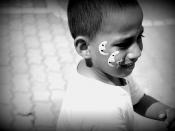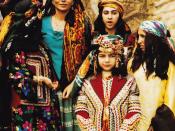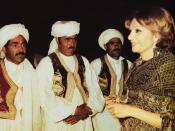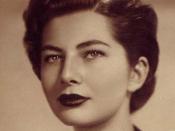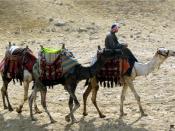Shabanu: Reflection Paragraphs Chapters 1 & 2: The first two chapters in the book were very interesting to me. The author describes the basics of family life. Everyone respects each other, and works hard to support the family. I was surprised when I read that children were married at a very young age, and their parents arranged the marriage. Marriage was very important to the Nomadic people. Also, I learned how important animals were to them. The author talks a lot about animals, especially camels.
Chapters 3 & 4: In this part of the story, the author explains Shabanu and her feelings in great detail. Shabanu is a young girl who has a fascination with camels, and doesn't want to have her marriage arranged. I became very interested in the book when Shabanu saw Mithoo being attacked by birds with his mother dead. Shabanu risks her life to save Mithoo, and that shows that she is very brave and kind towards animals.
She has adapted to living in the desert very well, and has extraordinary survival skills.
Chapters 5 & 6: The next two chapters tell about the family traveling to a town to sell camels. Camels are important to the Nomadic people for transportation, but Dadi has to sell them for money. Camels are great animals, because they have adapted to the desert, and require minimal care. They can store water for a long while, so people do not have to constantly let them drink. Shabanu became very attached to a certain camel named Guluband. She is very sad and angry when Dadi has to sell him, and I think I would be mad too. Dadi probably didn't want to sell Guluband either, but he needed the money to support the family.
Chapters 7 & 8: In chapters seven and eight, the author explains even more about the importance of camels. Camels have adapted to living in the desert, so they have a special flap on their noses to protect from sandstorms. These chapters also show how much Shabanu and her family appreciate clothes and gifts given to them. They very rarely receive luxury items, so they are very excited about small things we take for granted.
Chapters 9 & 10: In this part of the book, Shabanu's family pierces all the new baby camels' noses. They use a needle to make a hole in the camels' noses, and then place a wooden peg in the hole. It seems like it would hurt the camel, but it is important to pierce their noses. It can help identify their camels from other families' camels that might get mixed up.
Chapters 11 & 12: In the next two chapters of the story, Shabanu meets her aunt, Sharma. Sharma ran away from her husband, because he beat her and her daughter, Fatima. They were a very rich family, but Sharma couldn't stay and be beaten. Shabanu's other aunt greatly disapproves Sharma running away with her child. If I were put in Sharma's point of view, I would definitely had run away, because even if you are rich and in a great family, it's not worth being beaten, especially when your daughter is being beaten, too.
Chapters 13 & 14: Chapters thirteen and fourteen explain a lot about the strange weather in the Middle East. There are tons of storms that happen in desert. They are much more dangerous, because sand is blown at incredible speeds, that can cause lots of damage to people and property. Shabanu and her family carry lots of supplies to be prepared for a sandstorm. Also, in the Islamic religion, proper burials are always required for the deceased. The family performs burials, not a professional.
Chapters 15 & 16: In these next two chapters, Shabanu's grandfather dies in a great sandstorm. Since his death wishes were to be buried with his comrades in Derawar, the family travels to Derawar to bury him. When they arrive, they are told that they cannot bury Grandfather with his comrades, because only high-class people are allowed to be buried there. The family decides to bury Grandfather's relics in Derawar and perform a proper burial somewhere else for him. I think Grandfather would be proud of them just because they tried their best to fulfill his wishes.
Chapters 17 & 18: In this part of the story, I would hate to be Phulan, because many terrible things happen to her. First, the Landlord is trying to rape her. I think that is terrible, and I would be frightened if I were Phulan. Second, Nazir Muhammad kills Phulan's arranged husband, Hamir. Phulan is left without a husband.
Chapters 19 & 20: In chapters nineteen and twenty, Shabanu is forced to marry Rahim Sahib instead of Murad. If Shabanu does not do this, the Landlord will rape Phulan. At first, Shabanu does not want to marry Rahim Sahib because he is very old. He is very rich though, so Shabanu would be very happy marrying him.
Chapters 21 & 22: In the next to chapters, nearing the end of the book, Phulan is married to Murad. It was very interesting learning how a Muslim marriage is performed. There are many strange traditions such as painting hands at the wedding, and wearing lost of jewelry. Also, Phulan and Murad could not to look at each other during the wedding. I have heard of a similar tradition in America for weddings where the Bride and Groom are not allowed to see each other until the ceremony.
Chapter 23: In the final chapter, Shabanu is afraid of being married to Rahim Sahib, so she runs away on her camel, Mithoo. I would be afraid, too if I had to marry an old man when I was still young. Mithoo falls and breaks his leg, so Shabanu cannot travel any farther. When Dadi finds her, he beats her very badly. I think it is wrong to beat your child, and he could have used a better form of punishment. Although it doesn't say in the book, Mithoo probably dies, because he was left in the desert with a broken leg.
